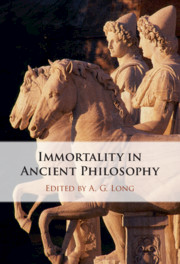Book contents
- Immortality in Ancient Philosophy
- Immortality in Ancient Philosophy
- Copyright page
- Contents
- Contributors
- Introduction
- Chapter 1 The Soul and the Celestial Afterlife in Greek Philosophy before Plato
- Chapter 2 Pythagorean Immortality of the Soul?
- Chapter 3 The Philosopher’s Reward: Contemplation and Immortality in Plato’s Dialogues
- Chapter 4 Pre-Existence, Life after Death, and Atemporal Beings in Plato’s Phaedo
- Chapter 5 The Immortal and the Imperishable in Aristotle, Early Stoicism, and Epicureanism
- Chapter 6 Socrates and the Symmetry Argument
- Chapter 7 Immortality in Philo of Alexandria
- Chapter 8 Plotinus on Immortality and the Problem of Personal Identity
- Chapter 9 Truth and Immortality in Augustine’s Soliloquies and De Immortalitate Animae
- Index of Passages
- Index of Names and Subjects
- References
Chapter 2 - Pythagorean Immortality of the Soul?
Published online by Cambridge University Press: 20 May 2021
- Immortality in Ancient Philosophy
- Immortality in Ancient Philosophy
- Copyright page
- Contents
- Contributors
- Introduction
- Chapter 1 The Soul and the Celestial Afterlife in Greek Philosophy before Plato
- Chapter 2 Pythagorean Immortality of the Soul?
- Chapter 3 The Philosopher’s Reward: Contemplation and Immortality in Plato’s Dialogues
- Chapter 4 Pre-Existence, Life after Death, and Atemporal Beings in Plato’s Phaedo
- Chapter 5 The Immortal and the Imperishable in Aristotle, Early Stoicism, and Epicureanism
- Chapter 6 Socrates and the Symmetry Argument
- Chapter 7 Immortality in Philo of Alexandria
- Chapter 8 Plotinus on Immortality and the Problem of Personal Identity
- Chapter 9 Truth and Immortality in Augustine’s Soliloquies and De Immortalitate Animae
- Index of Passages
- Index of Names and Subjects
- References
Summary
It is a commonplace among scholars that the early Pythagoreans posited an immortal soul. The earliest source to associate immortality of the soul to the Pythagoreans unequivocally, Dicaearchus of Messana, stipulates that they held that (a) the soul is immortal; (b) it changes into other kinds of animals; (c) there is eternal recurrence; and (d) embodied animate creatures are of the same genus. A problem with Dicaearchus' account is that each of these doctrines can also be found in the dialogues of Plato. Given Dicaearchus' penchant for conflating Platonic with Pythagorean philosophy, we cannot employ this account for a historical understanding of Pythagorean psychology in a straightforward way. This chapter instead investigates Pythagorean psychology through analysis of two passages of Aristotle’s De anima that are often not brought to bear on the question. One passage draws important comparisons between the psychology of the Pythagoreans and Democritean and Ecphantic atomism, suggesting that the early Pythagoreans held a material theory of soul; by reference to arguments similar to Cebes' in Plato's Phaedo (87b-e), the other explains how a transmigratory soul could nevertheless be mortal. The early Pythagoreans are thus likely to have held that the soul is material, mortal, and transmigratory.
- Type
- Chapter
- Information
- Immortality in Ancient Philosophy , pp. 41 - 65Publisher: Cambridge University PressPrint publication year: 2021

